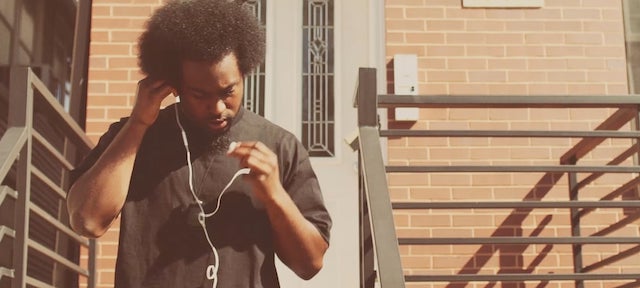
This post was written by Daniel Melvill Jones.
https://youtu.be/OF2K9SyPLzI
Micah Bournes is a hip-hop artist and spoken word poet. He doesn’t play any instrument, yet last year he released No Ugly Babies, an album of original blues songs. The songs are contagious, constantly forcing me to sing along. Yet their lyrics provoke perspectives that challenge my everyday attitudes and actions. For an artist who’s built his career around spoken word performances, spending four years in an unfamiliar medium was a significant financial and creative risk. To learn about why this was necessary, I spoke to Micah over the phone.
Micah sees himself not as a hip-hop artist or a poet, but as a creative writer. He had no intention on becoming a blues musician, falling in love with the genre only after creating a Pandora station around The Black Keys. “All of a sudden, Pandora started playing all these old-school blues artists. Growing up, my parents listened to a lot of soul and funk, not blues. But I felt so at home. The vocabulary they were singing and the stories they were telling were so familiar. I realized that was because blues came out of the black American tradition. My grandma’s from Mississippi, so everything these songs were communicating reminded me of my great-uncles and aunties and grandmothers and cousins.” When Micah sat down to write, instead of poetry or rap, the words in his head would come out in a blues song. “At the time I didn’t sing, so I had no intention of doing anything with these songs. They were ideas in my head, so why not get them out?”
Hip-hop and spoken word poetry are built around verbal dexterity and constant talking. Writing blues was different. “When I first started writing, I realized I was too wordy because of my hip-hop background. These new songs required a simpler vocabulary, drawn from a common, everyday language rooted in a specifically African-American way of speaking. I learned to be precise and more intentional with my diction and word choice. Every word matters.” Micah also noticed the use of repetition in blues music. “It doesn’t feel monotonous or boring. It causes the messages to sink in, like I’m chanting to you.”
Micah would continue to write mostly poetry, yet every few months a new blues songs would emerge. After three years, a small collection of songs began to form. While on a spoken word tour, Micah bonded with a musician and producer over their shared interest in blues-rock music. Towards the end of the tour, Micah took a risk and shared his fledgling writing project with his new friend. “I don’t play guitar. I don’t really sing,” he confessed. “But I think these are good songs. If you like them, maybe we could collaborate and bring them to life.” Micah recorded himself singing the songs into his phone, emailed the files, and they began making an album. Micah hired a vocal coach, reached out to his musician friends, and invited his sister, mom, and brothers into the studio to sing background vocals.
“The whole process required vulnerability. When I record a spoken word project, I have so much confidence because it’s tried and true. But with blues, it was scary. For the first time in a long time I was in the studio feeling nervous and wondering if it’s good enough.” But this sense of imperfection worked well for the genre. “Blues was birthed out of the black community during a time of pain. They are singing about poverty, heartache, and facing prejudice. That doesn’t result in a clean, neat sound. I realized that while I can’t sing real pretty, but that’s not what I need. I need to channel the right emotions.”
Entering this new medium allowed Micah to communicate in ways that his previous genres couldn’t. “There’s a simplicity and repetition to blues. I realized that the songs I was writing would be sung in the shower. They would be played during commutes. They will get stuck in heads and hummed while vacuuming and cleaning. This was a responsibility and it made me think: what are the messages that I want folks to have on repeat in their heads? What are the truths that I want to be washing over their minds and hearts on a regular basis?” The title song celebrates that “God ain’t gave no ugly babies.” On it, Micah sings a repeated phrase: “I look good! I look good, ma, I look good.” Micah described it as, “a repeated, intentional phrase that you can tell yourself over and over again. And I love that. I love that people are walking around singing, ‘I’m not ugly.’ God made humans and he said, ‘It was good.’ Of course we are broken, but there still is beauty in who we are.”
Micah credits his approach making this album to David Bayles & Ted Orland’s book Art & Fear: Observations on the Perils (and Rewards) of Artmaking. “The theme of the book is: no matter how good of an artist you are, most of your work is going to suck. The purpose of the vast majority of your work is simply to show you how to create the small portion that will be good.” Micah explained how this gave him perspective. “It’s so arrogant to think that every time I pick up my pen everything I write will be brilliant. That’s so unrealistic and it’s so much pressure.”
Micah told me of a story he learned watching a documentary on Picasso. The artist was famous and wealthy, and his work was highly regarded. But when he died, they discovered in his basement canvas after canvas of mediocre paintings. “For every brilliant Picasso hanging in a museum, there were 10 in his basement collecting dust that he thought were not even good enough to share. That’s how I feel about writing. No matter how good I am, 8 out of 10 are going to be either mediocre or bad. If I let that discourage me, I’m just not going to have a lot of good art. But instead, if I write 100 poems, at least I’ll have 20 good ones.” With this attitude in mind, Micah allowed himself plenty of time and the freedom to fail while recording No Ugly Babies. “I didn’t have a deadline. It took me two full years. I didn’t expect everything to be amazing. I was figuring it out.” It wasn’t until half way though recording that they found their stride, requiring a complete start over on most of their songs.
Micah applies these principles to his spiritual life. “The authors of Art & Fear didn’t know it, but they wrote a devotional. People want the same instant success when it comes to spiritual growth and ministry. But…I’ve made so many decisions that have ended up crashing and burning.” During those times, it was tempting to throw up his hands and claim that God was done with him. Instead, Micah realized that this was not what God wanted and, not loosing hope, moved on and did something else instead. He also applies this to identity. “I’ve put a lot of vulnerability and a lot of myself into my art, but my art is not me. It’s something I do. Then if people don’t like my art, it doesn’t immediately mean they don’t like me. It’s the same thing with ministry. Don’t tie your identity as a Christian to your ministry. If it isn’t successful, you won’t assume that you’ve become a failure of a Christian.”
In Art and Fear, the authors note that artists often leave a thread loose in their work to pull on in their next project. I asked Micah if there were any themes in No Ugly Babies that he wanted to continue exploring. “Definitely. The concept of loving your enemy has been heavy on my heart, because there is so much division at this moment of time in America.” He is not afraid to label those in his country that are speaking evil as his enemies. “So what does it mean in this modern context to genuinely love my enemies? That’s a difficult thing to think through, but it’s something I want to be intentional about.” Whatever his future projects, the habits of art-making that Micah has practiced will continue to serve him and his listeners well.
No Ugly Babies can be downloaded for free from www.micahbournes.com, and his music is available on bandcamp, iTunes and all streaming services. Micah also sings blues on “Darkie,” the first single off Propaganda’s forthcoming album.
(Ed. note: Liz Vice, who graced us with an amazing performance at our recent conference in Tyler, TX is also featured on No Ugly Babies.)

COMMENTS
Leave a Reply













